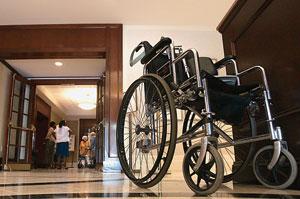|
|
The Growing Pains of Assisted Living
By Andrei Blakely, Washington Examiner
May 22, 2004

Assisted living centers wrestle growing risks. As increasing numbers of seniors need special care,
area facilities find themselves hard-pressed to provide safety.
Photo by Jay Westcott/Examiner
It has been four years since a mentally impaired patient killed Mary P. Marocchi as she sat in the television room at the Sunrise of Warrenton assisted living home.
According to court records, Gerald J. Wood, who suffered from Huntington's disease, an affliction causing sudden angry outbursts, allegedly attacked Marocchi, 84, who could not walk.
The room was full of elderly people, several in different stages of mental disability. One of them told police that Wood for no apparent reason picked Marocchi out of her chair and threw her to the ground, according to Jonathan Lynn, Commonwealth's attorney for Fauquier County.
Marocchi, who suffered a face laceration and contusion and hemorrhaging, died two days later. Wood, who was 53 at the time, was prosecuted. Later, John L. Marocchi, Mary's husband, filed a $5 million lawsuit that accused Sunrise of Warrenton of negligence for allowing Wood free roam of the facility. It was settled for an undisclosed amount of money.
Mary Marocchi's death is one example of sudden tragedy at an assisted living home in Virginia that underscores the danger that has emerged in these havens for the elderly.
"I have to say that the error in judgment was in admitting someone with Huntington's disease [and putting him] in the middle of a group of helpless elderly people," John Marocchi said in an interview. "That certainly was a mistake."
A popular retirement option
Assisted living facilities have become a vital part of the network for care of the elderly in the United States, and Virginia, with its favorable tax rates and moderate climate, has become a popular retirement area.
Census figures show that 6.5 million Americans need daily assistance, and as the nation ages, more and more citizens will need care. By 2040, 14.3 million people will have severe disabilities, the Journal of Gerontology predicts.
Characteristically, assisted living facilities help the elderly bathe, dress, do housework and balance their checkbooks, among other duties. They are neither hospitals nor mental institutions, experts argue, but places to live with assistance.
"This is becoming increasingly a very popular alternative for families who need loved ones [cared for]," said Maurice Jones, commissioner of Virginia's Department of Social Services. "I think it is because the model is one that appeals to residents and loved ones. This is not an institutional facility."
But there is another statistic which is important to understanding the assisted living story: Some 4.5 million Americans suffer from Alzheimer's disease, and this number too is expected to more than double by 2050. Whether assisted living facilities are equipped to handle patients with severe dementia is a major debate.
In Virginia, the number of licensed assisted living facilities grew 10 percent in 10 years, from 554 in 1994 to 620 in 2004, with the number of beds climbing some 30 percent to 34,400 from 26,209 in the same period, Jones said.
As the demand grows, thousands of patients are well cared for and have uneventful stays. The concern about life-threatening situations at the facilities has grown as well. Sunrise has since closed the Warrenton facility due to the aging building.
Wood had a history of violent behavior, according to court records. He came to Sunrise immediately after a stay in Culpeper Regional Hospital and had broken the wrist of a woman at an assisted living facility in Charlottesville before that.
'What's that guy doing here?'
Before his wife was attacked, Marocchi said he had noticed Wood in a hallway at Sunrise during a visit. "I said, 'What's that guy doing here?' He didn't fit," Marocchi said.
Wood was charged with second-degree murder on May 22, 2001, but he was found incompetent to stand trial and sent to Western State Hospital in Staunton, where he is incarcerated. Western State is a 252-bed psychiatric hospital that serves patients who are placed by a state appointed community service board or a judge.
Amy Casey, the Fauquier County public defender representing Wood, had no comment on the matter.
The case is an example of an assisted living facility sacrificing patients' safety to fill beds, said Robert T. Hall, an attorney who argued John L. Marocchi's civil suit. "An assisted living facility doesn't make money on an empty bed," Hall said. "Like airplanes, they have certain break-even points. They have to have a minimum percentage of occupancy.
"... From my perspective, if you admit a patient, you become responsible for them. ... [Wood] was put in as a general resident, which means he has the run of the premises. He could walk around to locations in the assisted living facility," Hall added.
The Marocchi incident was investigated by Social Services. Sunrise of Warrenton was found in violation for not including documented information about Wood's past abusive and aggressive behavior in his individual service program report.
Marocchi's death was not the only one under similar circumstances.
Dorothy H. Bochenek, a resident in Sunrise of Fairfax in the late 1990s, died Aug. 23, 2000, after lying in a coma for almost a year. According to a later report, attendants said they heard a big thud and found Bochenek on the ground bleeding at the bottom of a flight of stairs while another resident stood at the top of the landing telling her to "get up."
Between Jan. 1, 2000, and Jan. 1, 2005, the period in which the two women died, Sunrise provided for more than 2,000,000 resident days in Virginia facilities, said Sarah Evers, a spokeswoman for Sunrise. Thousands of residents have had positive experiences, she argued.
"Providing care and services for an elderly population carries some inherent risks," she said. "While Sunrise does everything possible to ensure a safe environment for residents, the potential for human error does exist."
|
|



